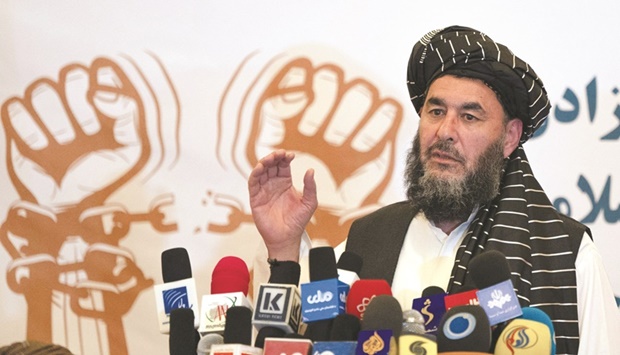An American navy veteran detained in Afghanistan since 2020 was released in exchange for a Taliban ally imprisoned in the US for heroin smuggling, US and Afghan officials announced yesterday.
The Taliban government freed Mark Frerichs, a navy veteran who was working as a civil engineer on construction projects in Afghanistan when he was detained 31 months ago.
The US government meanwhile released Bashar Noorzai, a former regional strongman who was sentenced to life imprisonment in a US court 17 years ago for smuggling large amounts of heroin.
“After long negotiations, US citizen Mark Frerichs was handed over to an American delegation and that delegation handed over (Noorzai) to us today at Kabul airport,” Afghan Foreign Minister Amir Khan Muttaqi said at a press conference.
“We are happy that at Kabul International Airport, in the capital of Afghanistan, we witnessed the wonderful ceremony of one of our compatriots returning home.”
Frerichs meanwhile flew to Doha, a US official said, adding that he was “in stable health.”
“Today, we have secured the release of Mark Frerichs, and he will soon be home,” President Joe Biden said in a statement.
“Bringing the negotiations that led to Mark’s freedom to a successful resolution required difficult decisions, which I did not take lightly,” he said.
Noorzai was welcomed with a hero’s fanfare by the government of the newly-styled Islamic Emirate of Afghanistan (IEA). Photos show he was greeted by masked Taliban soldiers bearing floral garlands.
“If the IEA had not shown its strong determination, I would not have been here today,” Noorzai said.
“My release in exchange for an American will be a source of peace between Afghanistan and Americans.”
Noorzai is the second Afghan inmate released by the United States in recent months. In June, Assadullah Haroon was released after 15 years of detention in the United States’ notorious Guantanamo Bay prison.
Haroon was accused of links to Al Qaeda but languished without charge for years at the US detention centre in Cuba, after his arrest in 2006 while working as a honey trader.
Afghan security analyst Hekmatullah Hekmat said Noorzai’s release was a “major achievement” for Kabul’s new rulers.
“The Taliban can tell their foot soldiers and Afghans that they are able to bring back their people held by opposition groups,” he told AFP.
Muttaqi said the homecoming of Noorzai marks the beginning of a “new chapter” in relations between Afghanistan and the United States.
For Washington Frerichs’ release was a priority issue to resolve after US forces withdrew from Afghanistan in August 2021 following the Taliban’s seizure of power.
The United States and allies have refused to recognise the new government, with Washington repeatedly telling the Taliban that they will have to “earn” legitimacy.
Biden had warned in January that the Taliban must release Frerich “before it can expect any consideration of its aspirations for legitimacy.”
Noorzai, a militia commander, once fought with US-backed mujahideen forces against the Soviet occupation of Afghanistan and was a close associate of the Taliban’s late founder Mullah Omar.
While he held no official position, Noorzai had “provided strong support including weapons” for the Taliban in the 1990s, Taliban government spokesman Zabihullah Mujahid told AFP yesterday.
After travelling to the United States in 2005 he was arrested, accused of running a “worldwide narcotics network.” When released he had served 17 years of a life sentence in a federal prison.
Biden, who spoke to Frerichs’ family ahead of the release, did not mention the deal involved.
But a senior Biden administration official said that the president okayed the swap in June after the Taliban made clear they wanted Noorzai in exchange for Frerichs’ freedom.
Granting Noorzai clemency and returning him would “not materially change” the situation for Americans or the state of the Afghan drug trade, the US official said.
The official said the deal was delayed as Biden ordered the drone strike that killed Al Qaeda leader Ayman al-Zawahiri in his Kabul residence on July 31.
Immediately after that, Washington quickly resumed pressure on Kabul for the exchange, warning them not to harm Frerichs and that a release could “begin to rebuild trust,” the official said.

Bashar Noorzai, a warlord and Taliban associate, speaks during a press event at the Intercontinental Hotel in Kabul yesterday. (AFP)
